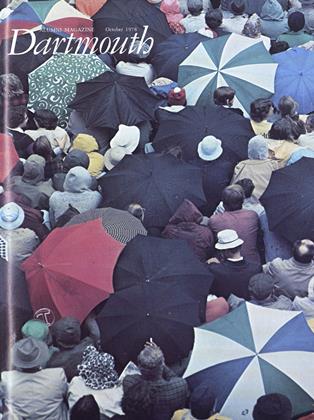Montgomery House on Rope Ferry Road presents an inviting though private face to the street. Its brick exterior is distinguished, yet mellow and warm; its interior is bright and cheerful, modern with no trace of austerity, a conversation piece at every turn.
Its inhabitants display the same traits in abundance. Kenneth and Elise Boulding, first incumbents of the Kenneth and Harle Montgomery visiting professorships and first residents of the house recently endowed as a "home, for the Montgomery Fellows, are both distinguished professors at the University of Colorado - she in sociology, he in economics. Both are renowned scholars who run counter to recent trends toward greater and greater specialization. He is president-elect of the American Association for the Advancement of Science; she is a consultant to UNESCO, a founder of the Consortium on Peace Research, and project director of Colorado's Institute of Behavioral Science. Both are warm and cordial, with a certain patina of age and experience.
One bright fall afternoon, with the trees on neighboring Occom Ridge just starting to flame, the Bouldings sat on their sunny porch and talked about their plans for carrying out the Montgomery's intent to bring to the campus "creative and innovative thinkers," who "enjoy working with students outside as well as within the classroom."
In the first place, they intend to teach classes at the house whenever possible. Mr. Boulding, who is at the College for only the fall term, is holding his seminar on "Normative Economics" at home on a regular basis. Mrs. Boulding's fall-term course on "Ethical Issues in the Policy Process," taught in participation with Professor Donella Meadows, meets at the house about half of the time. They anticipate entertaining student and faculty groups frequently and meeting informally with colleagues and undergraduates as opportunities arise.
Mrs. Boulding, who will be on the campus for the full academic year, intends specifically to become involved with campus women's groups, which she finds far more advanced at Dartmouth in the academic and personal mutual support they offer than at Colorado. Author of TheUnderside of History: A View of WomenThrough Time among other books, she has been long active in the women's movement. A 1940 graduate of Douglass College at Rutgers who took a master's degree in 1949, Mrs. Boulding started doctoral studies at the University of Michigan in 1965, after the youngest of the couple's five children was well along in elementary school. Before she joined the Colorado faculty in 1969, she says, "my only teaching had been in Quaker Sunday School in Ann Arbor."
Her own undergraduate experience confirms the Montgomery's conviction about the importance of informal interaction between faculty and students. At Douglass, she recalls, the most significant influences she experienced were outside the classroom, often in the homes of faculty members she never had in class. Mr. Boulding, an Englishman who did both undergraduate and graduate w;ork at Oxford, says that perhaps the closest analogy there would be with one's tutors. "I recollect one who turned me off, more than any who turned me on," he says, adding that, at Oxford, "it was the culture of the students themselves" that stimulated intellectual curiosity.
 View Full Issue
View Full Issue
More From This Issue
-
 Feature
FeatureThe Lady and the Truckers
October 1978 By Mary Ellen Donovan -
 Feature
FeatureBeauty and the Beasts
October 1978 By William Morgan -
 Feature
FeatureConundrum of the Gridiron
October 1978 By Jack DeGange -
 Feature
FeatureA Matter of Perspective
October 1978 -
 Article
ArticleSignal-Caller for the Hurt
October 1978 By D.M.N. -
 Article
ArticleOffice of Development Report of Voluntary Giving
October 1978
Article
-
 Article
ArticleNATIONAL MATH ASSOCIATION HONORS PROFESSOR YOUNG
March, 1924 -
 Article
ArticleMasthead
DECEMBER 1963 -
 Article
ArticleBequest Chairman of the Year
JUNE 1972 -
 Article
ArticleClass of 1990
May/June 2006 By Allison Caffrey '06 -
 Article
ArticleWhere the Buffalo Roam-Not!
MARCH 1999 By SCOTT MEACHAM '95 -
 Article
ArticleWith the Players
May 1938 By Sidney B. Cardozo Jr. '38


